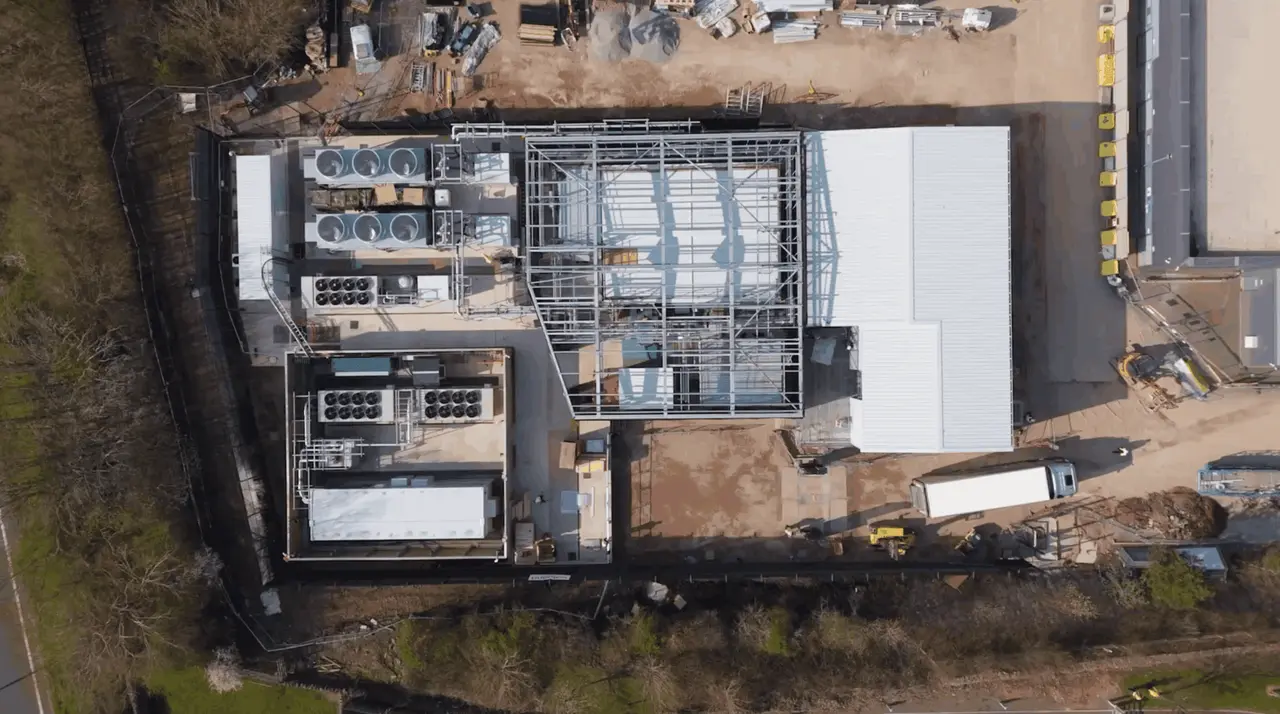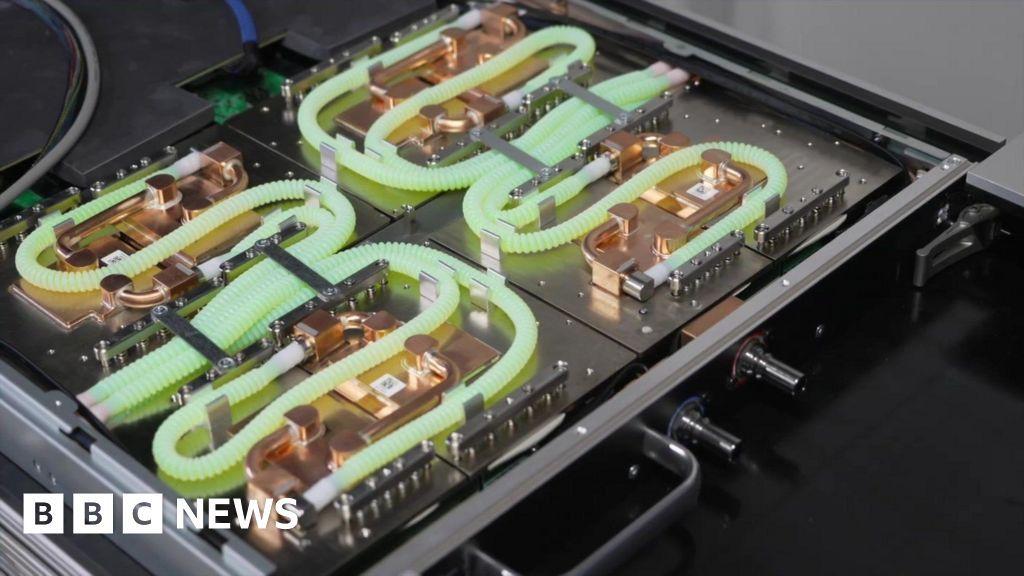UK Launches Isambard-AI: A Powerful Supercomputer Advancing AI Research and Applications
6 Sources
6 Sources
[1]
UK's most powerful supercomputer Isambard-AI comes online
A supercomputer that is the most powerful in the UK has been made fully operational in Bristol. Technology Secretary Peter Kyle "flicked the switch" on the Isambard-AI machine as the government unveiled fresh artificial intelligence plans. The computer will become part of the UK's public AI computing capacity along with a machine in Cambridge called Dawn. The aim is to use the supercomputer for public projects such as bringing down NHS waiting lists and developing new tools to tackle climate change - although AI is notoriously energy-hungry.
[2]
Isambard-AI, the UK's Most Powerful AI Supercomputer, Goes Live
The University of Bristol's Isambard-AI, powered by NVIDIA Grace Hopper Superchips, delivers 21 exaflops of AI performance, making it the fastest system in the U.K. and among the most energy-efficient globally. The U.K. has officially joined the premier league of global AI infrastructure -- and it's not starting small. At a ribbon-cutting ceremony at the Bristol Centre for Supercomputing (BriCS), leaders today unveiled Isambard-AI, the most powerful AI supercomputer ever built in the U.K. U.K. Secretary of State Peter Kyle was joined by leaders from across academia, industry and government, including Simon McIntosh-Smith, director of the Bristol Centre for Supercomputing, and Neil MacDonald, executive vice president and general manager for Hewlett Packard Enterprise's server business. "And as we press this switch to activate the UK's most powerful supercomputer, we are embarking on Britain's super future where AI contributes towards the delivery of better public services, greater public prosperity, deeper scientific discovery and stronger national security," Kyle said. The numbers back up Kyle's statement:
[3]
Britain just launched its top supercomputer. Here's how it ranks globally
The UK has just launched its most advanced supercomputer -- the 11th most powerful in the world. Isambard-AI, hosted at the University of Bristol, officially went live this week. The machine was built by Hewlett-Packard Enterprises (HPE) using its Cray EX architecture and fitted with over 5400 NVIDIA Grace Hopper superchips. Its raw computing power is measured at 216.5 petaflops, with a peak theoretical performance of 278.6 petaflops. For the uninitiated, one petaflop is equal to 1 quadrillion (1,000,000,000,000,000) calculations per second. The system is more than 10x faster than the UK's next-fastest supercomputer -- the Njoerd supercluster in London. Funded by £225mn ($300mn) in government money, Isambard-AI is designed to run demanding artificial intelligence and scientific calculations, from modelling protein structures to simulating climate change and training large language models. While Isambard-AI has become the UK's most powerful supercomputer, on the global stage, it faces stiff competition. According to the TOP500 rankings, the current world leader is El Capitan in the United States, which clocks in at a staggering 1,742 petaflops of actual performance. Frontier and Aurora take second and third place, both American-built systems operating above the 1,000-petaflop threshold -- the equivalent of one exaflop. The top three are the world's only currently operational exascale supercomputers. Europe's frontrunner, Germany's JUPITER Booster, ranks fourth globally. The continent also hosts four other machines in the top 10: Italy's HPC6 (6th), Switzerland's Alps (8th), Finland's LUMI (9th), and Italy's Leonardo (10th). Still, Isambard-AI's entry into the top 11 is a significant leap for the UK, whose Labour government wants to make the country a leader in AI development. Peter Kyle, the UK's science, innovation, and technology secretary, said the new machine would "propel" Britain to the "forefront of AI discovery." "Today we put the most powerful computer system in the country into the hands of British researchers and entrepreneurs," he said. Some of the first applications of Isambard-AI include powering a prostate cancer detection system developed by University College London and helping Liverpool researchers discover greener, more sustainable industrial materials. But Isambard-AI's reign at the top may be short-lived. In June, Prime Minister Keir Starmer's administration committed £750mn to a supercomputer in Edinburgh that aims to give the UK one of the world's few exascale systems.
[4]
UK powers on supercomputer that runs 21 quintillion operations/sec
The UK's most powerful publicly accessible AI supercomputer, Isambard-AI, has been officially switched on in Bristol. Named after the famous 19th-century engineer Isambard Kingdom Brunel, the £225 million machine marks a significant step in Britain's ambition to lead in artificial intelligence research. Secretary of State for Science and Technology Peter Kyle activated the system during a ceremony on Thursday, calling it "the raw computational horsepower that will save lives, create jobs, and help us reach net-zero ambitions faster."
[5]
UK's £225m AI supercomputer, Isambard-AI, launches in Bristol
Hopes £225m Isambard-AI in Bristol will unleash new era of technological, medical and social breakthroughs Britain's new £225m national artificial intelligence supercomputer will be used to spot sick dairy cows in Somerset, improve the detection of skin cancer on brown skin and help create wearable AI assistants that could help riot police anticipate danger. Scientists hope Isambard-AI - named after the 19th-century engineer of groundbreaking bridges and railways, Isambard Kingdom Brunel - will unleash a wave of AI-powered technological, medical and social breakthroughs by allowing academics and public bodies access to the kind of vast computing power previously the preserve of private tech companies. The supercomputer was formally switched on in Bristol on Thursday by the secretary of state for science and technology, Peter Kyle, who said it gave the UK "the raw computational horsepower that will save lives, create jobs, and help us reach net zero-ambitions faster". The machine is fitted with 5,400 Nvidia "superchips" and sits inside a black metal cage topped with razor wire north of the city. It will consume almost £1m a month of mostly nuclear-powered electricity and will run 100,000 times faster than an average laptop. Amid fierce international competition for computing power, it is the largest publicly acknowledged facility in the UK but will be the 11th fastest in the world behind those in the US, Japan, Germany, Italy, Finland and Switzerland. Elon Musk's new xAI supercomputer in Tennessee already has 20 times its processing power, while Meta's chief executive, Mark Zuckerberg, is planning a datacentre that "covers a significant part of the footprint of Manhattan". The investment is part of the government's £2bn push to attain "AI sovereignty" so Britain does not have to rely on foreign processing chips to make AI-enabled research progress. But the switch-on could trigger new ethical dilemmas about how far AI should be allowed to steer policy on anything from the control of public protests to the breeding of animals. One AI model under development by academics at the University of Bristol is an algorithm that learns from thousands of hours of footage on human motion, captured using wearable cameras. The idea is to try to predict how humans could move next. It could be applied to a wide range of scenarios, including enabling police to predict how crowds of protesters may behave, or predict accidents in an industrial setting such as a construction site. Dima Damen, a professor of computer vision at the university, said based on patterns in the human behaviours a wearable camera was capturing in real time, the algorithm, trained by Isambard-AI, could even "give an early warning that in the next two minutes, something is likely to happen here". Damen added there were "huge ethical implications of AI" and it would be important to always know why a system made a decision. "One of the fears of AI is that some people will own the technology and the knowhow and others won't," she said. "It's our biggest duty as researchers to make sure that the data and the knowledge is available for everyone." Another AI model under development could detect early infections in cows. A herd in Somerset is being filmed around the clock to train a model to predict if an animal is in the early stages of mastitis, which affects milk production and is an animal welfare problem. The scientists at Bristol believe this could be possible based on detecting subtle shifts in cows' social behaviour. "The farmer obviously takes a great interest in their herd, but they don't necessarily have the time to look at all of the cows in their herd continuously day in, day out, so the AI will be there to provide that view," said Andrew Dowsey, a professor of health data science at the University of Bristol. A third group of researchers are using the supercomputer to detect bias in the detection of skin cancer. James Pope, a senior lecturer in data science at the University of Bristol, has already run "quadrillions if not quintillions of computations" on Isambard to find that current phone apps to check moles and lesions for signs of cancer are performing better on lighter coloured skin. If confirmed with further testing, apps could be retuned to avoid bias. "It would be quite difficult, and frankly impossible to do it with a traditional computer," he said.
[6]
Nvidia is powering the UK's fastest superocmputer yet - here's what it can do
It's the 11th fastest in the world, and 10x faster than Britain's second-fastest The UK's most powerful AI supercomputer, Isambard-AI, is now fully operational at the Bristol Centre for Supercomputing (BriCS), with some serious Nvidia power at its core. With 21 exaFlops of AI performance backed by 5,448 Nvidia GH200 Grace Hopper superchips, Isambard-AI now ranks 11th on the Top 500 list of fastest supercomputers, making it one of the global leaders. Nvidia declared the British supercomputer is now 10x faster than the next UK supercomputer, and more powerful than all the others in the UK combined. Besides being the 11th fastest supercomputer globally, Isambard-AI also ranks fourth globally on the Green500 list for energy efficiency, demonstrating the progress being made to reduce the environmental impact of AI machines and data centers. Its eco-credentials are endless, including carbon-free power, waste heat recycling and a power usage effectiveness (PUE) of below 1.1 - among the best in the world. Build in collaboration with Nvidia, HPE and the University of Bristol, Isambard-AI received £225 million in government funding in the hope that the supercomputer would go on to aid across important humanitarian issues like drug discovery and climate modeling. "And as we press this switch to activate the UK's most powerful supercomputer, we are embarking on Britain's super future where AI contributes towards the delivery of better public services, greater public prosperity, deeper scientific discovery and stronger national security," UK Secretary of State Peter Kyle commented. Among its first projects are Nightingale AI, trained on NHS data to support earlier diagnoses and personalized care, BritLLM, designed to promote inclusivity and better public service delivery in the UK's languages, including Welsh; and UCL Cancer Screening AI for prostate cancer detection.
Share
Share
Copy Link
The UK has unveiled Isambard-AI, its most powerful supercomputer, in Bristol. This £225 million machine aims to boost AI research and applications across various sectors, marking a significant step in the country's AI ambitions.
Unveiling of Isambard-AI: UK's Most Powerful Supercomputer
The United Kingdom has officially launched its most advanced supercomputer, Isambard-AI, at the University of Bristol. Named after the renowned 19th-century engineer Isambard Kingdom Brunel, this £225 million machine represents a significant leap in the country's artificial intelligence infrastructure
1
5
.
Source: NVIDIA
Technical Specifications and Global Ranking
Isambard-AI, built by Hewlett-Packard Enterprises (HPE) using its Cray EX architecture, is equipped with over 5,400 NVIDIA Grace Hopper superchips. The system boasts an impressive 21 exaflops of AI performance, making it the fastest in the UK and one of the most energy-efficient globally
2
3
.With a raw computing power of 216.5 petaflops and a peak theoretical performance of 278.6 petaflops, Isambard-AI ranks as the 11th most powerful supercomputer in the world. This positions it behind systems in the United States, Germany, Italy, Switzerland, and Finland, but marks a significant advancement for the UK in the global supercomputing landscape
3
.Government Initiative and Future Plans
The launch of Isambard-AI is part of the UK government's £2 billion push to attain "AI sovereignty," reducing reliance on foreign processing chips for AI-enabled research progress. Technology Secretary Peter Kyle officially activated the system, emphasizing its potential to "propel" Britain to the "forefront of AI discovery"
4
5
.While Isambard-AI represents a major step forward, the UK government has already committed £750 million to develop an even more powerful supercomputer in Edinburgh, aiming to give the country one of the world's few exascale systems
3
.
Source: The Next Web
Related Stories
Applications and Research Potential
Isambard-AI is designed to tackle a wide range of complex computational tasks, including:
-
Healthcare: Powering a prostate cancer detection system developed by University College London and improving skin cancer detection on various skin tones
2
5
. -
Climate Change: Running simulations to better understand and address environmental challenges
1
. -
Materials Science: Assisting Liverpool researchers in discovering greener, more sustainable industrial materials
3
. -
Agriculture: Developing AI models to detect early infections in dairy cows, potentially revolutionizing animal welfare and milk production
5
. -
Public Safety: Creating algorithms to predict human motion and crowd behavior, which could be applied in various scenarios, including law enforcement
5
.
Ethical Considerations and Accessibility

Source: BBC
The deployment of such powerful AI capabilities raises important ethical questions. Researchers emphasize the need for transparency in AI decision-making processes and stress the importance of making the technology and knowledge accessible to all
5
.As the UK positions itself as a leader in AI development, Isambard-AI represents not just a technological achievement, but also a commitment to harnessing AI for public good across various sectors of society.
References
Summarized by
Navi
[4]
[5]
Related Stories
UK Revives £750 Million Edinburgh Supercomputer Project to Boost AI Research
12 Jun 2025•Technology

Nvidia CEO Praises UK's AI Potential as PM Starmer Pledges £1bn Investment
09 Jun 2025•Technology

Nvidia and OpenAI Lead Multi-Billion Pound AI Investment in UK, Vowing to Forge 'AI Superpower'
12 Sept 2025•Technology

Recent Highlights
1
OpenAI secures $110 billion funding round from Amazon, Nvidia, and SoftBank at $730B valuation
Business and Economy

2
Anthropic stands firm against Pentagon's demand for unrestricted military AI access
Policy and Regulation

3
Pentagon Clashes With AI Firms Over Autonomous Weapons and Mass Surveillance Red Lines
Policy and Regulation





